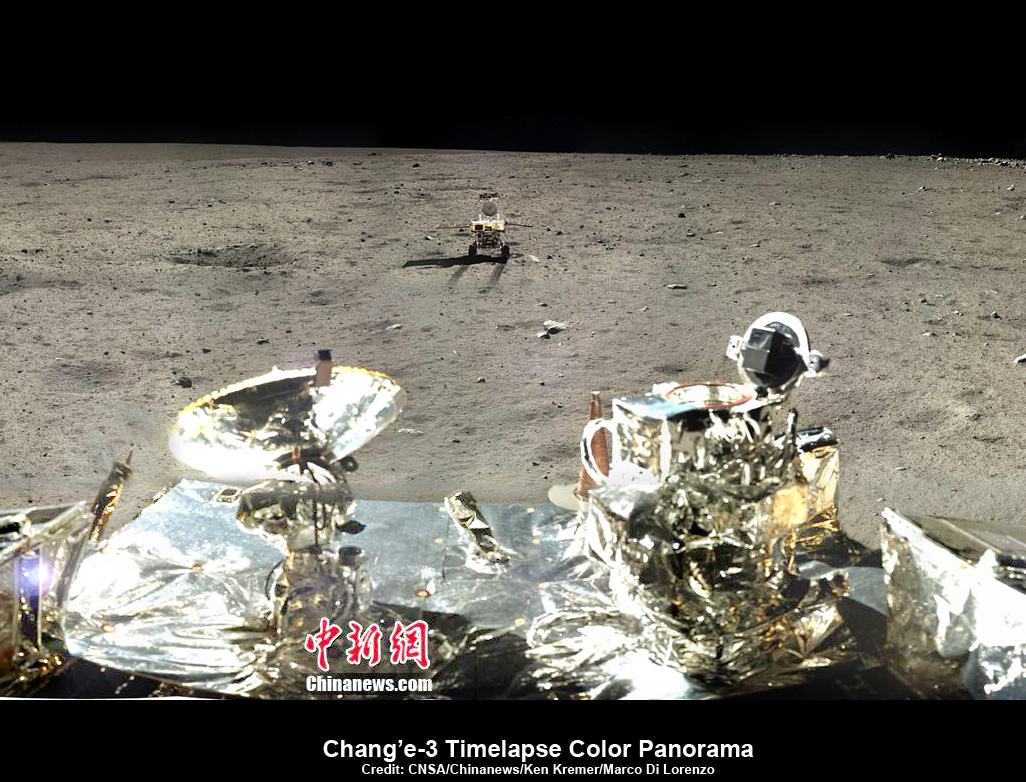Okay, then, continuing on with the Chinese space program.
Here's an outstanding picture of the Chinese Yutu rover, heading south from the Chang 3 lander.
It will be very interesting to see what type of longevity the Yutu has. For example, will it still be working and transmitting and performing experiments ten years from now like the NASA Opportunity Rover on Mars is after that long on the Martian surface? Time will tell.
The moon environment is very much harsher than that of Mars. Besides having to deal with the much greater cosmic radiation due to the lack of an atmosphere, the moon's surface temperature can vary in the range of less than 100 degrees C and more than 100 degrees C between night and day on the moon. It seems like Yutu is already facing some mechanical problem a day or two before going through its second hibernation.
English.news.cn 2014-01-25 15:01:46 More
BEIJING, Jan. 25 (Xinhua) -- China's moon rover, Yutu (Jade Rabbit), has experienced a mechanical control abnormality, and scientists are organizing repairs.
The abnormality occurred due to "complicated lunar surface environment," the State Administration of Science, Technology and Industry for National Defence (SASTIND) said on Saturday, without giving further details.
The abnormality emerged before the rover entered its second dormancy at dawn on Saturday as the lunar night fell, according to SASTIND.
The lander, another part of the Chang'e-3 probe, also "fell asleep" earlier on Friday.
The pair went dormant for two weeks about one month ago when the first lunar night of the mission occurred.
One night on the Moon is about 14 days on Earth, during which the temperature falls below minus 180 Celsius. During the lunar night, there is no sunlight to provide power to Yutu's solar panel.
After the first dormancy, the lander's Moon-based optical telescope carried out observation of the sky, while its extreme ultraviolet camera observed the plasmasphere over the Earth, according to SASTIND.
An Ultra High Frequency communication test between the lander and the moon rover was also conducted.
The rover obtained scientific data through its radar, panorama camera, a particle X-ray device and infrared imaging equipment, said SASTIND.
The Chang'e-3 lunar probe soft-landed on the Moon on Dec. 14. Yutu separated from the lander hours later.
The success of the Chang'e-3 mission makes China the third country to soft-land a spacecraft on lunar soil after the United States and the former Soviet Union.
Humans have conducted a total of 130 lunar probe activities with a success rate of only about 51 percent, Wu Weiren, chief designer of China's lunar probe program, said in an earlier interview with Xinhua.
China's lunar probe missions -- Chang'e-1, 2, and 3 -- have all succeeded, according to Wu.
Lunar probe mission failure is not rare. In April 1962, the U.S. lunar probe Ranger 4 crashed into the dark side of the Moon after equipment failure prevented it from returning pictures and scientific data.
Japan launched a lunar probe in 1990, which soon moved off course. It failed to transmit any data and crashed into the Moon in 1993.
India managed to send a lunar probe into space in 2008, but an equipment in the main craft malfunctioned several months later, leading to the loss of contact with the unmanned spacecraft.

